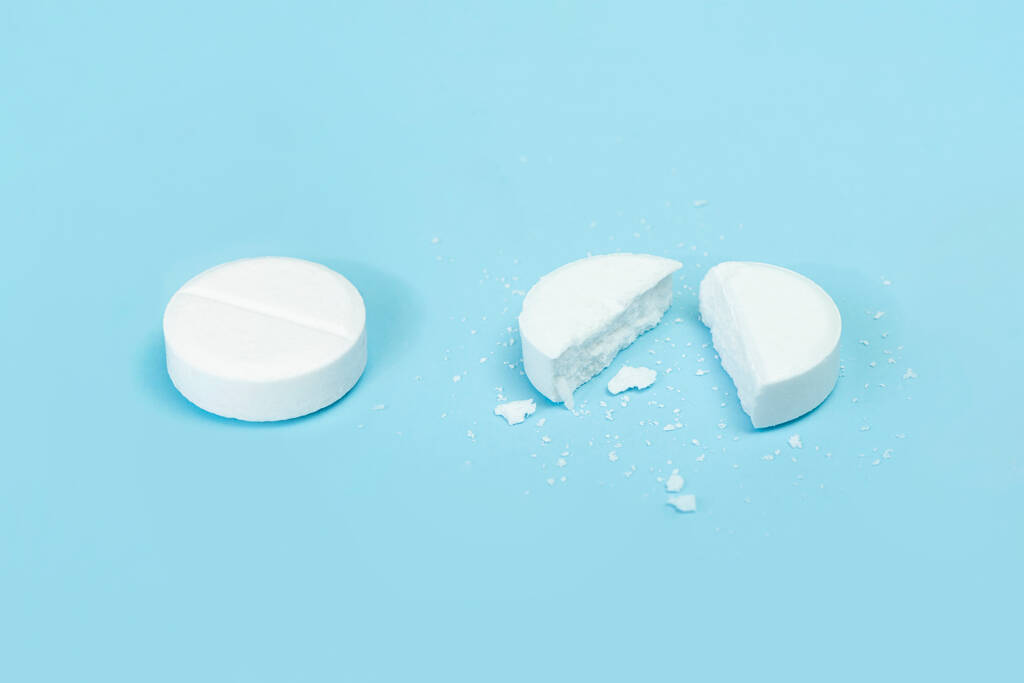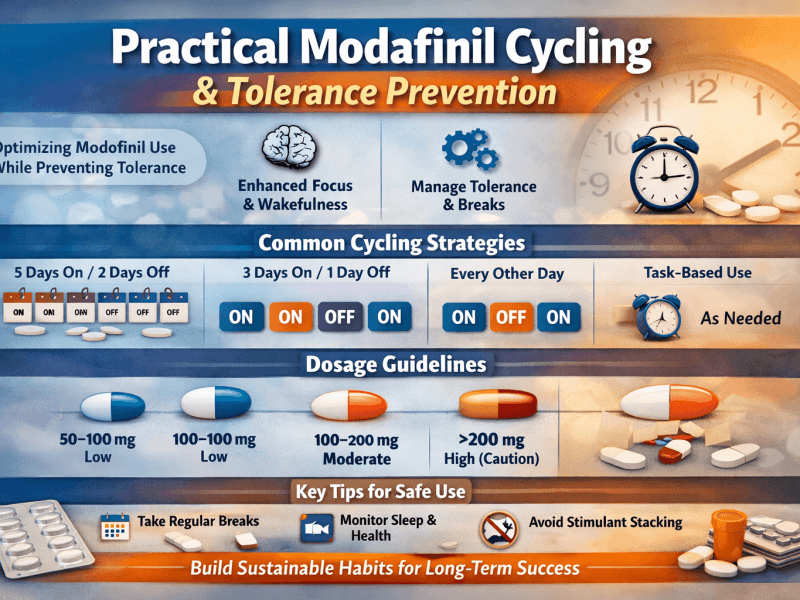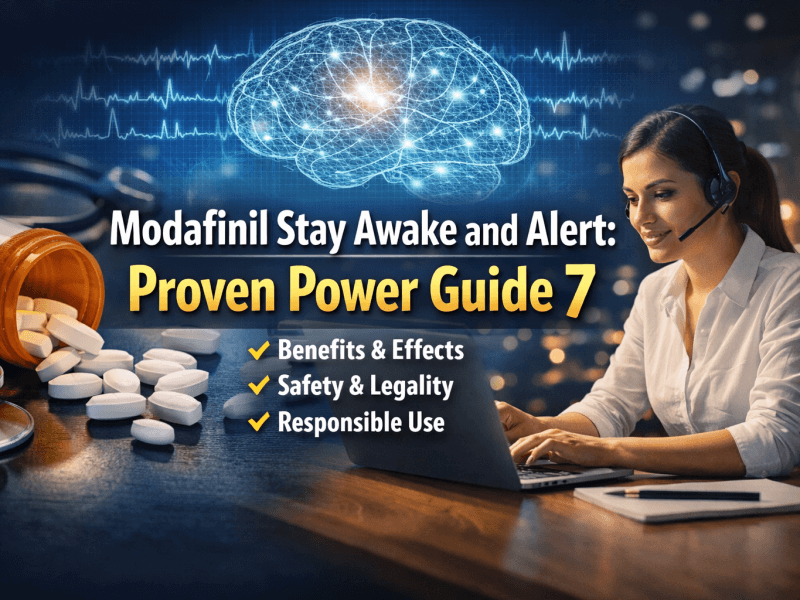Last Updated on 12/09/2025 by James Anderson
Introduction to Modafinil and Dose Adjustments
Modafinil is a well-known wakefulness-promoting medication used to treat conditions like narcolepsy, shift work sleep disorder, and obstructive sleep apnea related fatigue. For many, it’s a productivity-enhancing aid. However, the question of dose reduction often arises either due to side effects, medical advice, or personal experimentation.
What you need to know before halving your modafinil dose, including how it affects your body, the right approach to tapering, and expert recommendations.
Why People Consider Reducing Modafinil Dose
There are several reasons why patients or users might decide to lower their modafinil dosage.
Common Side Effects That Trigger Dose Reduction
- Headaches
- Nausea
- Nervousness or jitteriness
- Insomnia
- Elevated blood pressure
When these side effects become problematic, lowering the dose can help.
Doctor Recommendations vs. Self-Adjustments
Doctors may recommend reducing dosage if:
- Lab results indicate strain on the liver
- There’s evidence of cardiovascular stress
- The patient’s sleep cycle is improving naturally
Self-adjustment, however, can be risky without proper guidance.
How Modafinil Works in the Body
Understanding the pharmacology of modafinil is crucial before making any dosing decisions.
Mechanism of Action
Modafinil primarily increases dopamine and norepinephrine in the brain, enhancing wakefulness and alertness. It also influences histamine levels, which help keep you awake.
Typical Dosage Ranges
- Standard prescription: 200 mg once daily
- Some individuals respond well to 100 mg
- Higher doses (up to 400 mg) are rare and usually prescribed for severe cases
Key Factors to Evaluate Before Cutting Your Dose
Before deciding to reduce your dosage, consider:
Medical History and Pre-existing Conditions
Those with heart issues, liver problems, or psychiatric disorders must consult their doctor first.
Interaction with Other Medications
Modafinil interacts with birth control pills, certain antidepressants, and blood thinners.
Sleep Patterns and Lifestyle Changes
If you’ve recently improved your sleep hygiene or reduced work stress, your need for modafinil may decrease naturally.
Risks of Reducing Modafinil Too Quickly
Cutting your dose in half overnight can have consequences.
Potential Withdrawal Symptoms
- Fatigue
- Low mood
- Difficulty concentrating
Reduced Cognitive Benefits
Sudden reduction may cause a drop in productivity and focus.
Safe Step-by-Step Approach to Dose Reduction
Gradual Tapering vs. Sudden Cut
- Tapering: Reduce the dose by 25-50 mg every few days to a week
- Sudden Cut: Not recommended unless medically necessary
Monitoring Your Body’s Response
Keep a journal of sleep quality, mood, and focus levels.
Real-World Case Studies on Dose Reduction
Case studies show that gradual tapering is far more successful than abrupt changes, with fewer side effects and better adaptation.
Expert Opinions from Neurologists and Sleep Specialists
Experts stress that dose changes should be made under supervision. Dr. Emily Carter, a neurologist, notes:
“The brain adapts to modafinil use over time. A careful taper ensures your neurotransmitter balance remains stable.”
FAQ
1. Can I cut my 200 mg tablet in half?
Yes, but only if your doctor approves and the tablet isn’t extended-release.
2. How long does it take to adjust to a lower dose?
Usually 3-7 days, but it varies per individual.
3. Will I lose all the benefits if I lower my dose?
Not necessarily, many maintain benefits at lower doses.
4. Can I skip modafinil on weekends?
Some do, but it may cause fluctuations in alertness.
5. Is modafinil addictive?
It has low abuse potential, but psychological dependence can occur.
6. Should I change my diet when lowering my dose?
A nutrient-rich diet can help counteract fatigue.
Conclusion
Reducing your modafinil dose is a decision that should be informed by medical advice, personal health status, and lifestyle needs. Gradual reduction, close monitoring, and open communication with a healthcare provider will give you the best chance of maintaining energy and focus while avoiding unpleasant side effects.
‼️ Disclaimer: The information provided in this article about modafinil is intended for informational purposes only and is not a substitute for professional medical consultation or recommendations. The author of the article are not responsible for any errors, omissions, or actions based on the information provided.
References:
- Oliva Ramirez A, Keenan A, Kalau O, Worthington E, Cohen L, Singh S. Prevalence and burden of multiple sclerosis-related fatigue: a systematic literature review. https://doi.org/10.1186/s12883-021-02396-1 . 2021.
- Ciancio A, Moretti MC, Natale A, Rodolico A, Signorelli MS, Petralia A. Personality Traits and Fatigue in Multiple Sclerosis: A Narrative Review. Journal of Clinical Medicine. https://doi.org/10.3390/jcm12134518 . 2023
- Mereu, M., Bonci, A., Newman, A. H., & Tanda, G. The neurobiology of modafinil as an enhancer of cognitive performance and a potential treatment for substance use disorders. https://doi.org/10.1007/s00213-013-3232-4 . 2013
- U.S. Food and Drug Administration. PROVIGIL. U.S. Department of Health and Human Services. https://www.accessdata.fda.gov/drugsatfda_docs/label/2015/020717s037s038lbl.pdf . 2015
- Ballon JS, Feifel D. A systematic review of modafinil: potential clinical uses and mechanisms of action. J Clin Psychiatry. 2006
- Willavize, S. A., Nichols, A. I., & Lee, J. Population pharmacokinetic modeling of armodafinil and its major metabolites. https://doi.org/10.1002/jcph.800 . 2016
- ADHD: Clinical practice guideline for the diagnosis, evaluation, and treatment of attention-deficit/hyperactivity disorder in children and adolescents. https://www.ncbi.nlm.nih.gov/pubmed/22003063. 2011
- Arnold, V. K. A 9-week, randomized, double-blind, placebo-controlled, parallel-group, dose-finding study to evaluate the efficacy and safety of modafinil as treatment for adults with ADHD. Available at: https://www.ncbi.nlm.nih.gov/pubmed/22617860. 2012
- Clinical Pharmacology. Elsevier, Tampa, FL. Available at: http://www.clinicalpharmacology-ip.com. 2018


